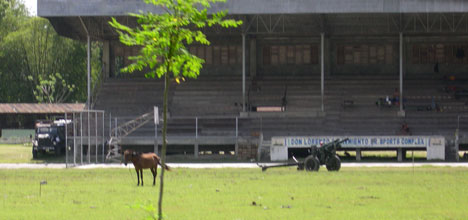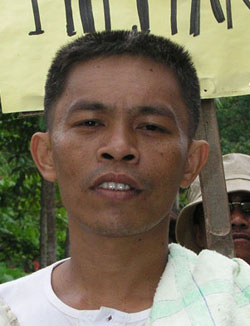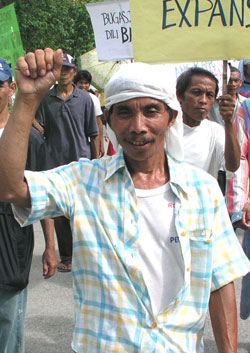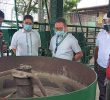In Compostela Valley�s villages, a de facto martial law exists. Civilians have been tortured, detained, harassed and killed as the military increases its presence in the resource-rich province in order to protect, according to residents and activists, plantation and mining companies. The deaths of Grecil Buya in March and the killing of two civilians by soldiers last Wednesday were the offshoots of yet another case of �development aggression.�

Garrison. The army has camped out in schools and public places in New Bataan, such as this sports complex where military equipment and hardware are in plain view. (davaotoday.com photo)
Related stories:
Grecil�s Parents File Raps Vs Soldiers; Holganza Doubts Girl Was Child Warrior
2 ComVal Residents Killed, 3 Others Wounded in Army Shooting
By Grace S. Uddin
davaotoday.com
NEW BATAAN, Compostela Valley — Ciano Mu�ez is distressed no end that, these days, he is the one taking care of his two children. The irony is that his wife, Nenita, is minding other people’s children — she works as a babysiter in Panabo City, earning a meager 1,500 pesos a month.
Prior to this, the 35-year-old Ciano earned between 200 and 400 pesos a day as a small-scale miner. Every day, he went up the mountains of this town to pan for gold. And every day, he came home bone-tired but comforted by the fact that his family would have something to eat the next day.
�My wife used to stay home and took care of the children because my earnings were sufficient for us,� Ciano told davaotoday.com last week.

Jobless. Ciano Mu�ez woes the loss of his job because of the harassment. (davaotoday.com photo by Barry Ohaylan)
Things changed in March, when armed men drove Ciano and about 200 other small-scale miners from Santa Fe, in Camanlangan village of this town where they worked the mines. Ciano is convinced that the armed men were soldiers who were acting as goons for Philcor Mining Corporation, a company that also mines the area.
According to the small-scale miners, the company did not want competitors for the rich gold deposits in this town, which is not far from the famous Diwalwal gold-rush site.
Fernando Ca�eda, 38, another small-scale miner who had been mining in the area longer than Philcor, was not as lucky as Ciano. �The goons came to our area, then they blocked our paths and threatened us. They told us to leave within three days, otherwise we should prepare our coffins,” Fernando recalled.
On March 5, armed men forcibly took Fernando. �I was tortured and brought to the New Bataan police station where I stayed for five days,� he said. He was accused of stealing from the gold veins in the mining area where he had been working for years now.

Terrified. Genito Obires is now afraid to go to the uplands. (davaotoday.com photo by Barry Ohaylan)
Fernando said the men who arrested him wore civilian clothes and had their faces covered with cloth. “But we knew they were soldiers because they were assisted by some Cafgus, some of them I knew,� he recalled. He got out of jail after his wife posted a bail of 8,000 pesos, which she had borrowed.
What happened to Ciano and Fernando mirrors the worsening human-rights situation in this town, which has seen an upsurge in the number of soldiers deployed, residents said. Along with the deployment came the usual abuses against civilians. (See �2 ComVal Residents Killed, 3 Others Wounded in Army Shooting� and “Grecil�s Parents File Raps Vs Soldiers; Holganza Doubts Girl Was Child Warrior“)
The heavy presence of soldiers in this town, according to residents and nongovernment groups, was directly related to the entry of mining and plantation projects that threaten the livelihood of people like Ciano and Fernando.
This province convulses every so often with the conflict between big miners and small miners; the presence of troops, according to critics, is an attempt to stifle whatever dissent from the grassroots that usually follows these major investments.










